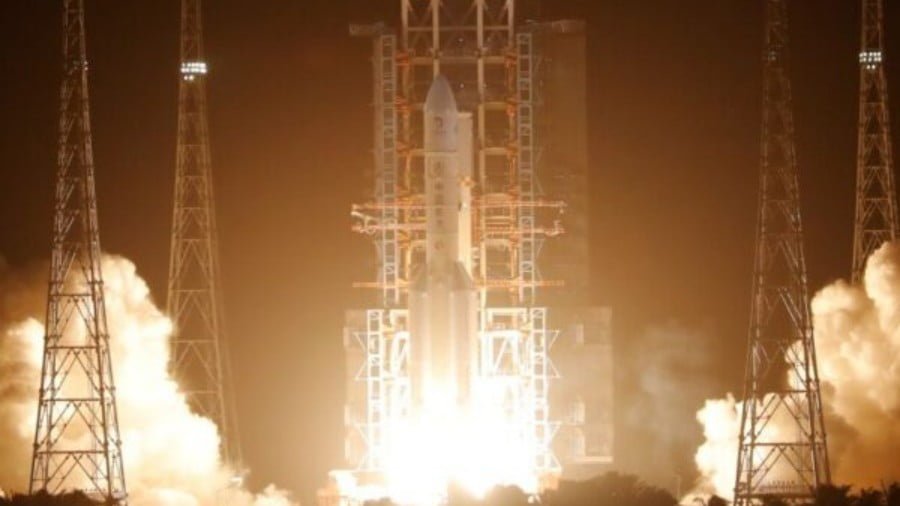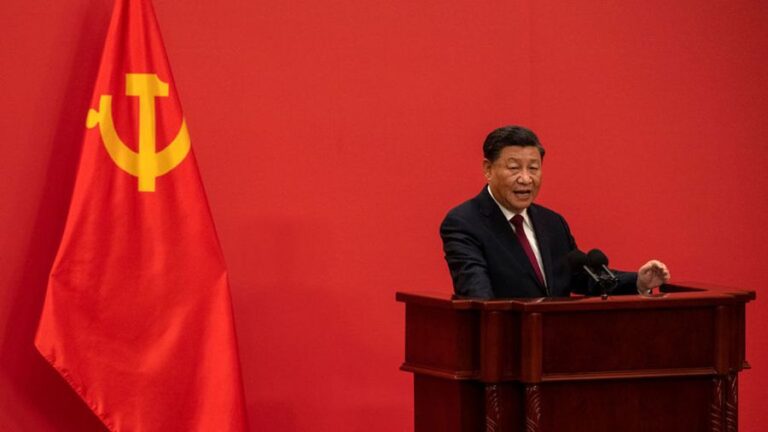The Dragon Has Woken and Washington Should Engage With It
There is no need for cringing appeasement, but aggressive toughness will lead only to disaster, Brian Cloughley writes.
The story is told that when the Emperor Napoleon was in his final exile he was asked what he thought would be the development to have most impact on the future and replied with words to the effect “Let the Dragon China sleep, for when she wakes she will shake the world.” Although it’s a compelling and generally popular phrase it was entirely fabricated, for Napoleon never said anything of the sort. But the fact remains that whoever made up that non-quotation was absolutely spot on, because after millennia of chaotic evolution the dragon has indeed woken, and the world is being stirred, if not shaken.
In December Science Magazine recorded that “China’s Chang’e-5 mission made a triumphant return around 1 p.m. EST today, landing in the middle of the night on the dark frozen plains of Inner Mongolia… The capsule’s return marks the first time China has collected rocks from the Moon — and the first time any nation has accomplished the feat since 1976.” The mainstream media of the west acknowledged the accomplishment, albeit in line with the New York Times report that “Space now is fast becoming one more arena where the two countries might clash. Although China’s military and civilian space programs are still catching up with those in the United States, the country’s ambitions were part of the Trump administration’s motivation to set up a Space Force.”
China carried out a most demanding scientific operation that brought some 4 pounds of rocks to earth for analysis, and Space magazine noted that Li Chunlai, deputy chief of the project, was understandably upbeat about the mission’s success, observing among other things that the “Chinese government is ready to share the lunar samples including relevant data with all like-minded institutions from other countries”, which is a responsible and laudable attitude. The problem, however, is that Washington doesn’t want to cooperate with China and the moon rocks are unlikely to be shared.
As observed by Wu Yanhua, deputy director of the China National Space Administration, “It has been unfortunate [that] after a Congressional act [the Wolf Act] adopted in 2011 U.S. space institutions have been blocked from cooperating with China… On the basis of equality, mutual benefit and win-win cooperation we are willing to conduct sincere and friendly cooperation with U.S. institutions.”
The Wolf Act epitomises the attitude of successive U.S. administrations concerning China, and this over-assertive and even hostile approach has gathered impetus in recent years. Its peak was signposted by the now mercifully departed Secretary of State Pompeo in July 2020 when he delivered a diatribe titled “Communist China and the Free World’s Future” in which, as reported by the Council on Foreign Relations he declared “that the era of engagement with the Chinese Communist Party is over [and] calls on Chinese citizens and democracies worldwide to press Beijing to change its behaviour and respect the rules-based international order.”
In December, intending to set the scene for a post-Trump administration, Pompeo’s colleague John Ratcliffe, the Director of National Intelligence wrote a piece for the Wall Street Journal (owned by the Murdoch empire, which has no ties with China) headlined “China Is National Security Threat No. 1” in which he declared that “the People’s Republic of China poses the greatest threat to America today, and the greatest threat to democracy and freedom world-wide since World War II.”
To be sure, the PRC is far from being a democracy, being run by the Communist Party with no alternative political organisation being permitted, but this does not make it, by definition, a threat to America or anywhere else. It is an autocracy in some ways similar to Saudi Arabia, a close U.S. ally in which, as the State Department records “Significant human rights issues include: unlawful killings; executions for nonviolent offenses; forced disappearances; torture of prisoners and detainees by government agents; arbitrary arrest and detention; political prisoners; arbitrary interference with privacy; criminalization of libel, censorship, and site blocking; restrictions on freedoms of peaceful assembly, association, and movement; severe restrictions of religious freedom; citizens’ lack of ability and legal means to choose their government through free and fair elections…”
The undemocratic behaviour of the Saudi’s absolute monarchy does not prevent the U.S. having a “strong economic relationship” with the regime, and it is notable that “Saudi Arabia is the United States’ largest foreign military sales customer, with more than $100 billion in active cases.”
China does not buy weapons from the United States, and is an authoritarian state of 1.3 billion people whose leaders are intent on keeping the country together and improving the living standards of its citizens. The methods whereby its economic advances are being effected have attracted massive criticism and strong reaction by the United States, but so far as fourteen Asia-Pacific countries are concerned, it seems that negotiation, mediation and cooperation are deemed preferable to confrontation, provocation and insults.
The Association of South East Asian Nations, ASEAN, comprises Brunei, Cambodia, Indonesia, Laos, Malaysia, Myanmar, the Philippines, Singapore, Thailand and Vietnam, with a total population of some 650 million. It held its 37th Summit meeting in Hanoi in November 2020 and, along with five other countries, signed the Regional Comprehensive Economic Partnership which “is an agreement to broaden and deepen ASEAN’s engagement with Australia, China, Japan, Korea and New Zealand. Together, these RCEP participating countries account for about 30% of the global GDP and 30% of the world population. The objective of the Agreement is to establish a… mutually beneficial economic partnership that will facilitate the expansion of regional trade and investment and contribute to global economic growth and development… ”
Note that China is a partner in this international accord. It’s not the leader, and has not attempted to impose any sort of controls, curbs or limitations on its commercial associates. The Communist government in Beijing is pleased to be in an economic partnership with fourteen other countries having varying forms of government and in many cases very different approaches to world affairs. In turn, these nations realise that China is a great power and wish to expand their ties to their common benefit without in any way endorsing — or condemning — the political leaning of Beijing’s government.
But the United States steered clear of the Regional Economic Partnership, and unfortunately it seems that the new Biden administration is likely to continue confrontation with China rather than engaging in dialogue. Biden’s picks for senior appointments in his executive departments are not expected to agree with China’s statement that “Despite our differences, China and the United States share a wide range of mutual interests and there is room for cooperation,” with, for example, his nominee for Secretary of State, Antony Blinken, telling the Senate that “President Trump was right in taking a tougher approach to China” and his pick for Director of National Intelligence, Avril Haines, declaring “China is a challenge to our security, to our prosperity, to our values across a range of issues and I do support an aggressive stance, in a sense, to deal with the challenge that we’re facing.”
These people seem to like being “tough” and “aggressive” and cannot accept that consultation, negotiation and compromise are not signs of weakness. Rather they are a sign of maturity and willingness to come to terms with the new global development. The Dragon has woken, and they would be well advised to engage with it. There is no need for cringing appeasement, but aggressive toughness will lead only to disaster.







